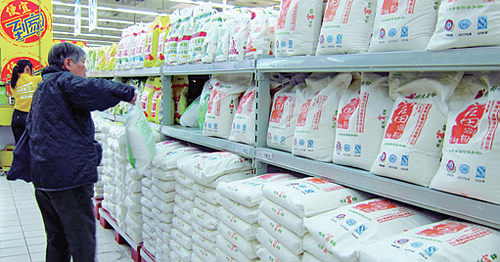|
 |
|
(CFP) |
Starting on May 1, China will ban the production and use of two food additives, benzoyl peroxide and calcium peroxide, which have been commonly used to whiten flour. Flour and related products containing the two food additives will be allowed to be sold until their expiration dates.
The Ministry of Health, along with six other ministries, announced the ban. A joint statement said the two additives are banned because "there is no need to use them in flour processing anymore" as wheat planting and milling techniques have improved.
"They are banned because they are not necessary," said Minister of Health Chen Zhu. He said so far to his knowledge, but there was no strong evidence proving the flour bleaching agents harmful to people.
Add attraction
Freshly milled flour is yellowish. After flour is exposed to the air for several weeks, the yellow pigments are oxidized naturally, and the flour will appear white. As the natural oxidization process takes time, chemical bleaching agents are used to speed it up.
Benzoyl peroxide was first used in China in the 1980s by flour milling plants in Guangdong Province to bleach flour. Bleached flour was well received in the market, especially for producing steamed buns, a staple food in north China.
In 1986, the Ministry of Health approved benzoyl peroxide as a food additive, allowing a maximum of 0.06 gram of this chemical in 1 kg of flour.
Wang Ruiyuan, Vice President of the China Cereals and Oils Association (CCOA), supported benzoyl peroxide to be listed as an allowable food additive in 1986, when he headed the Cereals and Oils Department of the Ministry of Commerce. Benzoyl peroxide was used as a food additive in a number of countries at that time, Wang said.
But, in 1997, the EU banned benzoyl peroxide in food because of its possible adverse effects, which sparked a debate over whether benzoyl peroxide should be banned in China.
Those supporting the continuing use of benzoyl peroxide said international studies showed reasonable use of the chemical would not pose health risks, and it was still used in countries such as Canada and the United States.
In Canada, 0.15 gram of benzoyl peroxide in 1 kg of flour is acceptable, while in the United States, the Food and Drug Administration has always recognized it as safe as a direct food ingredient.
The Codex Alimentarius Commission, an international organization that develops food standards and guidelines, stipulates the maximum content of benzoyl peroxide used in 1 kg of flour is 0.075 grams.
But those favoring a ban insisted benzoyl peroxide was not necessary and potentially harmful.
Wang said his attitude toward benzoyl peroxide had changed since learning it was banned in the EU.
In 2001, when Wang served as vice president of CCOA, the CCOA joined 65 large domestic flour-processing companies calling for a ban on flour bleaching agents.
Their petition said as non-nutritional chemical substances, flour bleaching agents harm the human body. It especially accused benzoyl peroxide, a strong oxidant, of destroying nutrients in flour such as Vitamin A and B.
The petition also quoted research saying long-term consumption of bleached flour could cause liver problems.
A consumer survey conducted in May 2006 revealed 87 percent of the respondents said they would not buy flour whitened by bleaching agents.
In 2007, at the annual session of the China National Food Industry Association, 70 large flour-processing companies again proposed a ban on flour bleaching agents.
In October 2007, the Ministry of Health solicited feedback from food additive producers, flour processors and consumers for the first time on whether to ban benzoyl peroxide as a food additive.
Yet conflicts of interest among different parties resulted in the government's indecisiveness on whether to ban flour bleaching agents or not, said Chen Junshi, a researcher with the Chinese Center for Disease Control and Prevention.
In China, food additives regulation involves several government agencies, including the Ministry of Health, the General Administration of Quality Supervision, Inspection and Quarantine, the State Administration for Industry and Commerce and the State Food and Drug Administration.
It also involves various departments related to environmental protection, agriculture and food production. Often, all the agencies disagree.
Flour processors are divided on the issue. Although large flour processors support a ban, some small millers are against it.
An executive surnamed Ma in Zhengzhou Haiweili Food Co. Ltd. recently told a Beijing media, flour bleaching agents could help small plants to improve the appearance of their products, whereas large flour processors were not very dependant on bleaching agents because they were better equipped and could afford to purchase high-quality wheat from home and abroad.
Ma said 90 percent of China's 40,000 flour-processing factories were small businesses in rural areas. "Small milling plants purchase wheat of varied quality from local farmers and generally are not as well equipped as large factories. Their flour is not very white, so they prefer to use bleaching agents," he said.
Last year, some small flour-processing factories sent a joint letter opposing the ban to the Ministry of Health, said Feng Ping, chief engineer of the Beijing Academy of Food Science and a member of the National Committee of the Chinese People's Political Consultative Conference (CPPCC).
These plants alleged flour bleaching agents could increase the extraction rate of flour by 5 percent, and a ban would eliminate small and medium-sized milling companies from the market. They demanded evidence proving benzoyl peroxide is unsafe, and said a ban without sufficient evidence was groundless.
| 